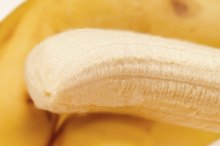Can Papaya Lower Blood Pressure?
As a dietary source of potassium, papaya may help lower your blood pressure. This tropical fruit -- grown in Hawaii, Florida, California, Mexico and Puerto Rico -- is rich in potassium, a mineral that counteracts the effects of sodium and helps you keep your blood pressure within a normal range. A compound in papaya may have potential as an anti-hypertensive treatment, according to an article published in the Jun. 8, 2000 issue of “Phytotherapy Research.” However, the Food and Drug Administration, or FDA, has not approved papaya extracts as pharmaceutical products.
Potassium Content
With 781 mg of potassium per fruit, papaya is one of the best dietary sources of this mineral and electrolyte, according to Drugs.com. The American Heart Association, or AHA, recommends that you get 4,700 mg of potassium each day from the foods you eat to control your blood pressure. The average American consumes too much sodium in processed foods, canned foods, restaurant or fast-food meals and table salt, according to the AHA. Excessive sodium in your diet can lead to chronic high blood pressure, or hypertension, which increases your risk of heart attack and stroke. One papaya provides 16 percent of the recommended daily amount for this mineral. Adding more papaya to your diet may help you keep your blood pressure within a healthy range and prevent the complications of hypertension.
- With 781 mg of potassium per fruit, papaya is one of the best dietary sources of this mineral and electrolyte, according to Drugs.com.
- The American Heart Association, or AHA, recommends that you get 4,700 mg of potassium each day from the foods you eat to control your blood pressure.
Clinical Research
What Is the Potassium Content in a Banana?
Learn More
The authors of a study published in the June 2000 issue of “Phytotherapy Research” report that a form of papaya extract lowered blood pressure in laboratory animals. A.E. Eno and co-authors conclude that a compound in papaya juice has anti-hypertensive properties. More research is required to determine whether papaya extract could produce similar effects in human subjects. When used as a topical treatment to debride wounds, a papaya enzyme called papain may cause dangerously low blood pressure in humans, according to the FDA. Because of the potentially harmful side effects of papain, the FDA has not approved the use of products that contain this enzyme for medicinal use.
- The authors of a study published in the June 2000 issue of “Phytotherapy Research” report that a form of papaya extract lowered blood pressure in laboratory animals.
Recommendations
To increase the amount of papaya in your diet, add papaya to fruit salads or spicy salsas. The soft, melon-like texture of papaya lends itself to fruit smoothies or milkshakes. You can purchase papaya in many supermarkets throughout the year, but early summer and fall are this tropical fruit’s peak seasons, according to FoodReference.com. If papaya is not available in your local grocery store, try other dietary sources of potassium. One cup of prune juice offers 707 mg of potassium, one cup of cantaloupe has 494 mg, and one sliced tomato has 404 mg, according to Drugs.com. Dried peas, lentils, sweet potatoes or white potatoes, broccoli, cauliflower, fish, poultry and milk products provide potassium. In addition to eating high-potassium foods to lower your blood pressure, the AHA advises that you reduce your intake of highly processed foods, canned foods and table salt.
- To increase the amount of papaya in your diet, add papaya to fruit salads or spicy salsas.
Precautions
Does Potassium Thicken Your Blood?
Learn More
Although dietary potassium will probably not produce harmful effects, you may need to restrict your intake of supplemental potassium if you are elderly or have kidney disease, the AHA notes. Your kidneys control the excretion of potassium from your body. As you age, your kidneys may not remove excess potassium as effectively, which could lead to fluid imbalance and affect your cardiovascular health. Consult your doctor before taking supplemental potassium or making changes in your diet to control your blood pressure.
- Although dietary potassium will probably not produce harmful effects, you may need to restrict your intake of supplemental potassium if you are elderly or have kidney disease, the AHA notes.
Related Articles
References
- Drugs.com: Potassium Content of Foods List
- American Heart Association: Potassium and High Blood Pressure
- PubMed.gov: Blood-Pressure Depression by the Fruit Juice of Carica papaya (L.) in Renal and DOCA-Induced Hypertension in the Rat
- U.S. Food and Drug Administration: Unapproved Drugs: Drugs Marketed in the United States that Do Not Have Required FDA Approval
- Foodreference.com: Papaya Food Facts
- Papayas, raw. FoodData Central. U.S. Department of Agriculture. Published April 1, 2019.
- GI foods advanced search. The University of Sydney. 2019.
- Vitamin C fact sheets for professionals. National Institutes of Health. Office of Dietary Supplements. Updated 2019.
- Vitamin A fact sheet for health professionals. National Institutes of Health. Office of Dietary Supplements. Updated 2019.
- Schweiggert RM, Kopec RE, Villalobos-Gutierrez MG, et al. Carotenoids are more bioavailable from papaya than from tomato and carrot in humans: A randomised cross-over study. Br J Nutr. 2014;111(3):490-8. doi:10.1017/S0007114513002596
- Ido H, Matsubara H, Kuroda M, et al. Combination of gluten-digesting enzymes improved symptoms of non-celiac gluten sensitivity: A randomized single-blind, placebo-controlled crossover study. Clin Transl Gastroenterol. 2018;9(9):181. doi:10.1038/s41424-018-0052-1
- McRae MP. Dietary fiber Is beneficial for the prevention of cardiovascular disease: An umbrella review of meta-analyses. J Chiropr Med. 2017;16(4):289–299. doi:10.1016/j.jcm.2017.05.005
- Papaya- the benefits. American Cancer Society. Cancer Survivors Network. 2011.
- Cross-reactivity between papaya, mango and cashew. American Academy of Allergy Asthma & Immunology. Updated 2019.
- Selecting and serving produce safely. U.S. Food & Drug Administration. Updated 2018.
Resources
Writer Bio
Anne Tourney specializes in health and nutrition topics. She is a registered nurse with experience in medical-surgical nursing, behavioral health and geriatrics. Tourney earned a Bachelor of Science in nursing from Regis University.









